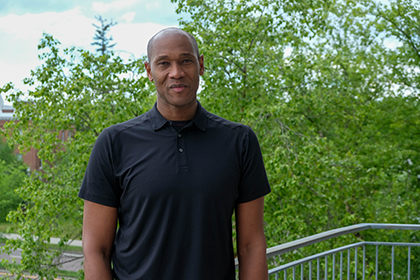Andra Stevenson, Ph.D.’01, Returns to UVM to Share Insights on Mentorship and Career Journey

Andra Stevenson, Ph.D.’01 Named Distinguished Graduate Alumnus
Andra Stevenson, Ph.D.’01, Returns to UVM to Share Insights on Mentorship and Career Journey
Andra Stevenson, Ph.D.’01 was recently granted the Distinguished Graduate Alumni Award in recognition of his achievements and contributions to the University of Vermont. This honor is awarded to alumni from the UVM Larner College of Medicine’s Ph.D. or M.S. programs who have demonstrated outstanding achievement in basic, clinical, or applied research; education; industry; public service; humanitarianism; and/or outstanding commitment to the Larner College of Medicine community. As the recipient of this award, Stevenson shared highlights of his professional and academic journey in a thought-provoking lecture titled “Unlocking Success Together: Navigating Achievement Through the Power of Mentorship and Collaborative Growth.”
“Graduate students are a key part of our institution,” said Chris Berger, Ph.D., professor of molecular physiology and biophysics, professor of biochemistry, and associate dean of graduate education and postdoctoral training. “It is an immense pleasure to award this honor to Andra—a former student and a friend.”
Stevenson began his academic journey at UVM in the late nineties, earning a bachelor’s degree in biology and sociolinguistics. He subsequently worked as a research technician in the UVM Department of Pharmacology. His passion for research eventually led him back to UVM as a Ph.D. candidate. Under the guidance of pharmacology chair and University Distinguished Professor Mark Nelson, Ph.D., his research focused on calcium signaling in vascular smooth muscle, which plays a crucial role in blood vessel regulation. His work shed light on how calcium regulates gene expression in vascular smooth muscle cells, contributing to our understanding of this field.
In 2001, Stevenson continued his research as a postdoctoral fellow at the University of Virginia School of Medicine. He later joined Merck & Co., Inc., transitioning into the pharmaceutical industry in 2006 as a senior research biologist. Over the years, he held various roles at Merck, with increasing responsibilities across multiple therapeutic areas, including hypertension, heart failure, respiratory, and diabetes.
“Transition into all of these varied roles didn’t happen by chance,” said Stevenson. “It is because of all the different people, like Mark, Chris, Karen [Lounsbury] … so many others, who saw the potential in me. They trusted me. And, because of that, you drive yourself a little harder, and you push yourself a little more, because you owe it to [your mentors].”
Stevenson now serves as senior director in global medical and scientific affairs at Merck. He oversees the heart failure therapeutic area and has made significant contributions in thrombosis. He also is a member of several scientific societies, including the American Heart Association, the American College of Cardiology, the American Diabetes Association, the European Society of Cardiology, the European Association for the Study of the Liver, the European Association for the Study of Diabetes, and the Association of Black Cardiologists.
Beyond his professional accomplishments, Stevenson is deeply committed to mentoring junior scientists, particularly students of color. He has mentored more than a hundred individuals through collaborations with various organizations in both the private and public sectors. His dedication has had a profound impact on the development of young scientists.
“It is all about giving back,” concluded Stevenson. “Knowing your network, the opportunities you’ve been afforded. You have an obligation to pass that on to others. You don’t become successful in a vacuum.”